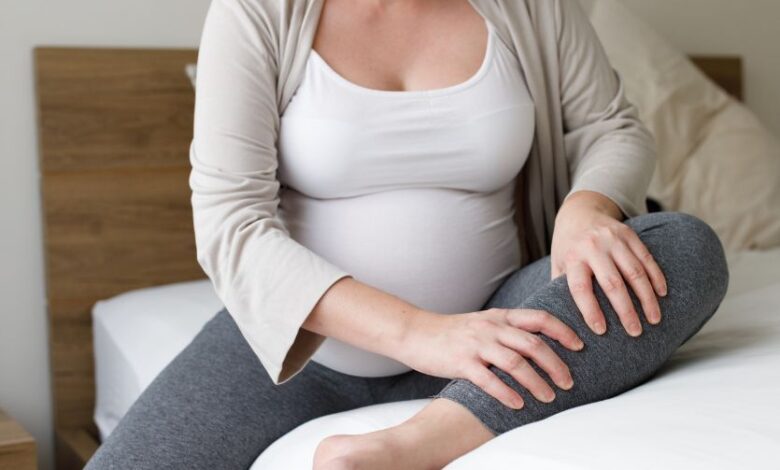Handling Restless Leg Syndrome During Pregnancy

As if things like nausea, fatigue and constant urination weren’t annoying enough during your pregnancy – there’s also something quite enjoyable that many pregnant women experience called Restless Leg Syndrome (RLS).
What is Restless Leg Syndrome?
RLS – or ‘the jimmy legs’ as I like to refer to it here – can be described as a strong or uncontrollable urge to move your legs to relieve an unpleasant sensation. You may get a tingling or burning sensation in your calf, thigh or foot– or they may be uncomfortable. Some women even describe the feeling as being like having a panic attack.
Fortunately, Restless Leg Syndrome is not dangerous or a sign that something is wrong. But these nocturnal leg cramps can disrupt your sleep — and that’s definitely not fun when you’re pregnant.
What causes this?
RLS usually peaks in the third trimester — around the 7th or 8th month of pregnancy, when estrogen levels are particularly high — and usually disappears entirely by the time you have your baby. No one really seems to know what causes it. But there are a number of theories about possible culprits.
- Iron deficiency, folate deficiency and changes in hormones have the potential to increase the prevalence of restless leg syndrome
- Caffeine can make symptoms worse so if you can afford it, you can try to completely eliminate caffeine from your diet
- Poor blood circulation
- Not enough movement during the day
- Lying down while reading or watching television at bedtime can make things worse – so really, don’t do anything pleasurable and you’ll be fine
There isn’t any official test to diagnose it, but your doctor can have your iron levels checked.
Treatment of restless legs syndrome
Pregnant women who have dealt with RLS have laid out several guidelines to help reduce discomfort including:
- Walking (even just around the house)
- Stretching and yoga
- Hot bath
- Massages and foot rubs
- Rinse your legs and feet in cold water before bed (not a full bath, just rinse the feet)
- Some women keep a food diary to see if something they eat (usually later in the day) triggers restless legs at night.
- Adding iron-rich foods like spinach, beans and whole-grain bread to your diet
- You can ask your doctor or midwife if you might need an iron supplement or a tweak to your prenatal vitamins– or possibly magnesium supplements, vitamin B12, vitamin C, vitamin D, or folate
- Try avoiding caffeine to see if it helps you get a better night’s sleep
- Certain medications can make RLS symptoms worse, such as certain antidepressants or medications that block dopamine, such as anti-nausea medication.
- Raise your legs above your heart for about 20 minutes each day
- There’s even a foot wrap treatment that puts pressure on your feet and seems to signal your brain to relax your muscles. It sounds interesting, but you need a prescription and leg wraps are quite expensive, so you might want to try compression stockings first. Although it doesn’t hurt to ask your medical practitioner.
Some people even swear by home remedies like eating bananas or sleeping with soap under the covers on their feet. Hey – if you’re willing to try anything, why not? Having had it myself, I know how uncomfortable and annoying RLS can be. I personally find that adding a giant pregnancy body pillow between my legs as part of my sleep routine is the best way to get me comfortable.
The good news is – it doesn’t often last long. And with some of these tips, hopefully you’ll be able to manage it until your weeble arrives and the RLS symptoms subside.
To summarize RLS
Restless Leg Syndrome, also known as Willis-Ekbom Disease, can be a real pain in the – er, legs – but if you suffer from it, you’re definitely not alone. More than 9 million people in the US live with moderate to severe symptoms of RLS.
While there is no cure yet, simple lifestyle changes like stretching, walking more, massaging the muscles in your legs, avoiding stimulants like caffeine and adopting healthy habits sleep may bring at least some relief.
Other remedies, such as wearing compression socks or prescribed foot wraps, and taking medications and supplements may also help treat Restless Leg Syndrome.
Did You Have Restless Leg Syndrome During Pregnancy?
Did something work for you? I want to know!
Our next reco: Termination of Pregnancy is the Worst





